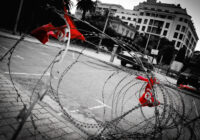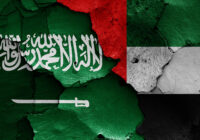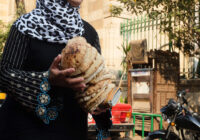On March 2, the Lebanese lira (or pound) eroded even further into becoming a failed currency, if there is such a thing. From an official exchange rate of 3,900 pounds per US dollar for importers and manufacturers of essential food items, the “cost of scarce dollars hit 10,000 Lebanese pounds on Tuesday, said three currency dealers on the informal market, a main source of cash since banks stopped dispensing dollars,” Reuters reports. A note from a Lebanese on WhatsApp best sums it up: “We are dying, 10,000:1, people are crying in the streets.” Lebanese television carried stories about the pain caused by another decline in the currency’s value — about people who can no longer afford to buy food and those who are just trying to get together enough money to leave the country.
Toward the end of last year, many demanded on social media that the government use the gold reserves at the central bank — Banque du Liban (BDL) — to inject more liquidity into the monetary system. While this would have stripped Lebanon of its last bunker of fiscal security, the BDL proceeded to print even more pounds, giving credence to the expression “good money after bad,” except that it’s all bad. The good money in Lebanon can’t be accessed by depositors due to informal capital controls and the dwindling foreign currency reserves, which are being squeezed to pay subsidies on basic products.
The COVID-19 Crisis Has Catalyzed Vision 2030
While “fresh money” or new dollar deposits from overseas can be withdrawn for a full range of banking operations — such as foreign currency cash deposits and withdrawals, issuance of banker’s checks, local and international transfers, letters of credit, and commercial transactions in US dollars, euros and other major currencies — this has not relieved the pressure on consumers facing dramatic increases in the cost of living. The most recent currency drop means that the average minimum wage in Lebanon is equal to $68 a month. In Syria, as of 2017, the monthly average was $100 per month — the lowest in the Arab world at the time.
According to a recent Bloomberg survey, consumer prices skyrocketed by 145.8% in December versus the same month of 2019. This was most painful in food, rising more than 400% from a year ago, along with clothing up 560%, restaurant and hotels at 609%, and furnishing and maintenance up 655.1%. Food security has become the most critical issue in the country, surpassing concerns with securing COVID-19 vaccines. While the recent snowfall in Lebanon made for great pictures, it exacerbated heating fuel issues and the difficulty of navigating muddy fields and tent cities that the refugees endure.
“Fixing” the Problem
A number of “fixes” are being floated to reestablish the value of the lira — from a currency board that would stabilize the lira by setting a fixed exchange rate with a foreign currency, to dollarization replacing the lira completely for transactions with a foreign currency. Any solutions must deal in the immediate term with two basic challenges: enabling a transparently functioning BDL and restraining government expenditures, while creating an economy attractive to international investors. There are many specialists who claim that properly constituting the central bank and preventing it from funding government expenditures are the most impactful actions that can be taken and the quickest route to domestic and international credibility and trust. Dealing with the massive core liability of the national debt as a result of years of mismanagement and corruption will take many more years and require painful adjustments from public sector employees and local banks holding Lebanese government bonds.
The complexity of finding the “right” solutions is highlighted in the BDL report that at the end of February 2021, foreign currency assets fell by 41% from February 2020. This was largely due, among other reasons, to the financing of subsidies for essential consumer items, including imports of fuels, wheat, medicine, medical equipment, a basket of around 300 food and non-food items, and raw materials for agriculture and industry. Unfortunately, the current scheme subsidizes across the whole population, benefiting high-income consumers as well as those in extreme poverty.
While the subsidies have been helpful, the caretaker minister of economy and trade, Raoul Nehme, and his economic adviser, Dr. Leila Dagher, note that in “summary, the current scheme is unaffordable, inequitable, and inefficient as a policy instrument to help the poor and vulnerable but was necessary as a quick fix until a full-fledged program is designed and implemented.” They point out that, “It is estimated that the central bank’s current foreign exchange subsidy scheme will deplete its reserves by approximately $7 billion in 2021 if no changes are implemented.”
An Unconditional Cash Transfer System
The current subsidies regime suffers not only from unequal benefit. Nehme and Dagher add: “Moreover, millions of non-Lebanese benefit from the government subsidies. In addition, authorities are unable to monitor prices of subsidized products across the whole country, and even worse, control smuggling across the border.” Subsidized food and medicine imports intended for Lebanese have appeared in Syria, Kuwait, Turkey, East Africa and elsewhere, benefiting from porous borders exploited by Syrian and Hezbollah smugglers. This both takes essential products away from needy Lebanese and generates profits for cartels. At one point, social media circulated footage of fuel trucks headed into Syria with illicit shipments until the publicity forced them to use alternative, less public routes.
Of increasing concern is the theft of medicines and medical equipment, much of it donated by overseas Lebanese and humanitarian organizations. In February, expatriate Lebanese in the Congo teamed up with the Lebanese ambassador to Kinshasa, Haitham Ibrahim, to expose the smuggling of vital drugs from Lebanon. This is at a time when Lebanese are suffering from a shortage of medicines and hundreds of pharmacies have shut down.
Nehme and Dagher recommend the adoption of an unconditional cash transfer (UCT) card system that has been used around the world and currently in the Syrian refugee camps in Lebanon. The UCTs have a number of benefits aside from diminishing smuggling and ending subsidies for those with high incomes. UCTs are denominated in US dollars, so they do not add to inflationary pressures and instead support small businesses. Since recipients are targeted through a national registry, the spending leads to an “increase in household assets, consumption, psychological well-being, and food security. Last but not least, cash transfers allow households to have autonomy over their own lives by giving them the flexibility of choosing between different bundles of goods and services.”
Without a significant, immediate and transparent set of solutions to alter the downward trajectory of the fiscal and banking regimes in Lebanon, the country faces a bleak spring. This is due in large part to a leadership that prefers to let the country fall into the abyss while counting on the international community to come to the rescue. The oligarchy will be disappointed. The message from abroad is clear: Implement reforms and funds will come. Without commitment and action from the government, Lebanon will soon drown in its financial excess and humanitarian tragedy.
*[An earlier version of this article was published by ATFL.]
The views expressed in this article are the author’s own and do not necessarily reflect Fair Observer’s editorial policy.
Support Fair Observer
We rely on your support for our independence, diversity and quality.
For more than 10 years, Fair Observer has been free, fair and independent. No billionaire owns us, no advertisers control us. We are a reader-supported nonprofit. Unlike many other publications, we keep our content free for readers regardless of where they live or whether they can afford to pay. We have no paywalls and no ads.
In the post-truth era of fake news, echo chambers and filter bubbles, we publish a plurality of perspectives from around the world. Anyone can publish with us, but everyone goes through a rigorous editorial process. So, you get fact-checked, well-reasoned content instead of noise.
We publish 3,000+ voices from 90+ countries. We also conduct education and training programs
on subjects ranging from digital media and journalism to writing and critical thinking. This
doesn’t come cheap. Servers, editors, trainers and web developers cost
money.
Please consider supporting us on a regular basis as a recurring donor or a
sustaining member.
Will you support FO’s journalism?
We rely on your support for our independence, diversity and quality.








Commenting Guidelines
Please read our commenting guidelines before commenting.
1. Be Respectful: Please be polite to the author. Avoid hostility. The whole point of Fair Observer is openness to different perspectives from perspectives from around the world.
2. Comment Thoughtfully: Please be relevant and constructive. We do not allow personal attacks, disinformation or trolling. We will remove hate speech or incitement.
3. Contribute Usefully: Add something of value — a point of view, an argument, a personal experience or a relevant link if you are citing statistics and key facts.
Please agree to the guidelines before proceeding.